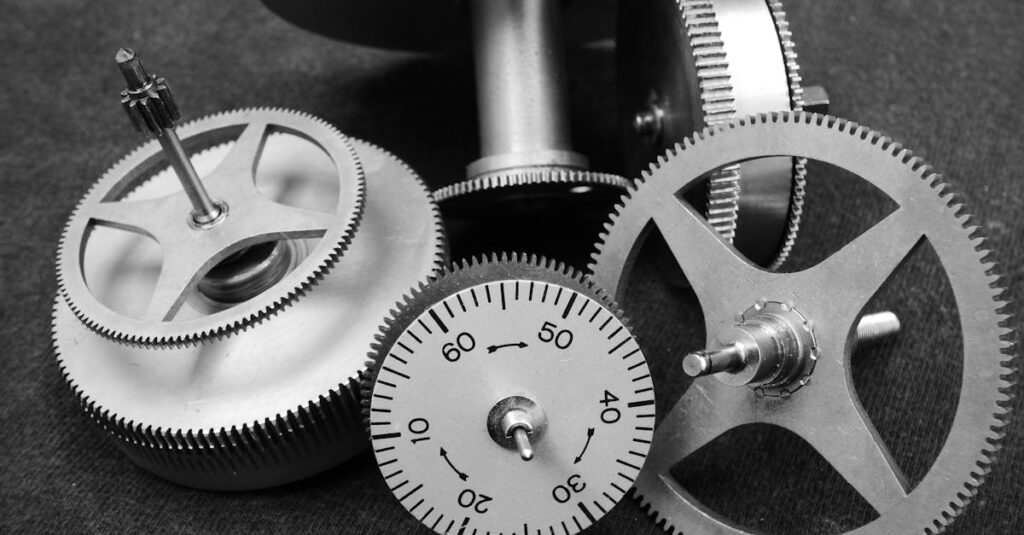In a world where technology reigns supreme, hardware control systems are the unsung heroes making everything tick. Imagine a conductor leading an orchestra—without them, the symphony would be a cacophony. These systems manage everything from your smart fridge to industrial machinery, ensuring they perform their magic seamlessly.
Table of Contents
ToggleOverview of Hardware Control Systems
Hardware control systems play a vital role in today’s technology landscape. They ensure consistent performance across various devices, providing stability and enhancing functionality.
Definition and Importance
Hardware control systems manage the operation of physical devices. These systems interpret input signals and generate reliable outputs to control machinery and appliances. Their significance spans various sectors, including automation, robotics, and consumer electronics. In automation, such systems enhance efficiency and precision, leading to cost savings and improved productivity. They facilitate seamless interaction between components, ensuring that functions proceed without interruptions. Furthermore, organizations depend on these systems to maintain safety and reliability in critical operations.
Key Components
Several key components constitute hardware control systems. Sensors detect changes in the environment, while actuators execute specific commands based on sensor data. Microcontrollers serve as the brains of the system, processing information and coordinating responses. Communication interfaces handle data exchange between components, enabling synchronization. In addition, power supplies provide the necessary energy for operations, ensuring devices function optimally. Each component interacts closely, creating a cohesive system to enhance control and responsiveness in technology.
Types of Hardware Control Systems
Hardware control systems can be classified into two main categories: open loop systems and closed loop systems. Each type has distinct features and applications that influence their effectiveness in various scenarios.
Open Loop Systems
Open loop systems operate without feedback. These systems execute commands based solely on input signals, processing them to produce outputs. For example, a washing machine’s cycle completes without adjusting for load variations. Open loop systems excel in tasks that are repetitive and do not require adjustments. They are generally simpler and less expensive than their closed loop counterparts. Applications include basic home appliances like toasters and heaters, where precise control isn’t critical. While they offer efficiency in stable conditions, they lack adaptability, making them suitable only in specific contexts.
Closed Loop Systems
Closed loop systems incorporate feedback for improved control. These systems continuously monitor output and adjust operations based on real-time data. For instance, a thermostat maintains room temperature by comparing actual temperature to a set point. The feedback loop enables these systems to respond dynamically to changes, enhancing accuracy and reliability. Closed loop systems find extensive use in complex automation processes, robotics, and aerospace applications. Reliability ensures consistent performance, while adaptability allows for operation in varying conditions. Although typically more complex, their precision justifies the investment in many advanced technological domains.
Applications of Hardware Control Systems
Hardware control systems find extensive applications across various industries, significantly contributing to operational efficiency and precision.
Industrial Automation
In industrial automation, hardware control systems play a pivotal role in streamlining manufacturing processes. These systems enable the automation of repetitive tasks, which reduces human error and enhances productivity. Sensors and actuators work in tandem to accurately control machinery, ensuring optimal performance and minimal downtime. Automated assembly lines, for instance, rely on these systems to manage material handling and quality control. Furthermore, real-time data processing allows for continuous monitoring, leading to quick adjustments when necessary. Enhanced safety measures are also integral, as these systems can halt operations in response to anomalies, protecting both machinery and workers.
Robotics
Robotics heavily relies on hardware control systems to achieve sophisticated movements and tasks. The integration of sensors allows robots to perceive their environment accurately, enabling them to respond dynamically to changes. Microcontrollers serve as the brain of robotic systems, processing inputs and directing actuators for precise actions. Applications range from manufacturing robots to surgical robots, each designed with specific functionalities in mind. In advanced robotics, closed loop systems ensure that robots adapt to feedback, improving their operational efficiency. Whether in warehouses or hospitals, these systems enhance robot responsiveness and reliability, making them indispensable in modern technology.
Advantages and Disadvantages
Hardware control systems offer a blend of benefits and challenges that impact their effectiveness across various applications.
Benefits of Hardware Control Systems
Enhanced performance represents a core advantage of hardware control systems. These systems improve efficiency in processes, significantly reducing the likelihood of human error. Cost savings emerge through automation, as labor requirements decrease and productivity increases. Consistent and reliable output from devices results from real-time data processing, ensuring smooth operations. Furthermore, the integration of advanced safety features within these systems protects both machinery and personnel, making them essential for industries where risks are inherent.
Challenges and Limitations
Complexity presents a significant challenge for hardware control systems. Increased complexity often translates to higher initial costs and requirements for specialized expertise. Maintenance can become demanding due to the intricate nature of these systems, leading to potential downtimes. Additionally, dependence on accurate feedback means that any malfunction in sensors can compromise overall system performance. Limited adaptability poses another concern for open loop systems, which cannot adjust based on real-time data, affecting their suitability for more dynamic applications.
Future Trends in Hardware Control Systems
Innovations in hardware control systems continue to shape various sectors. These advancements reflect the integration of smarter solutions.
Emerging Technologies
Next-generation control systems utilize machine learning algorithms to analyze data rapidly. Robotics now features AI-driven components that enhance decision-making processes. Additionally, the introduction of Internet of Things (IoT) devices enables seamless connectivity among hardware. Enhanced sensors provide more accurate data for real-time monitoring. Furthermore, advancements in wireless communication strengthen the efficiency of control systems. Another promising trend is the development of edge computing, which processes data closer to the source, reducing latency. With these technologies, hardware control systems become more adaptive and responsive.
Impact on Industries
Manufacturing sees significant changes as hardware control systems improve automation. These systems increase productivity by optimizing workflows and minimizing downtime. In healthcare, precise control systems support advanced medical devices, enhancing patient care and safety. Agriculture also benefits, with automated systems improving crop yields through efficient resource management. Meanwhile, smart home technology relies on hardware control systems that create energy-efficient environments. Transportation systems leverage these innovations to enhance vehicle safety and performance. Overall, industries can expect increased innovation driven by evolving hardware control trends.
Conclusion
Hardware control systems are at the heart of modern technology, ensuring devices operate smoothly and efficiently. Their ability to manage complex interactions between components enhances performance across various industries. As advancements continue to emerge, these systems will only grow more sophisticated, integrating AI and IoT for even greater capabilities.
The future holds immense potential for hardware control systems to revolutionize sectors like manufacturing, healthcare, and smart home technology. By embracing these innovations, industries can achieve unprecedented levels of productivity and safety. The journey of hardware control systems is just beginning, and its impact will resonate for years to come.





